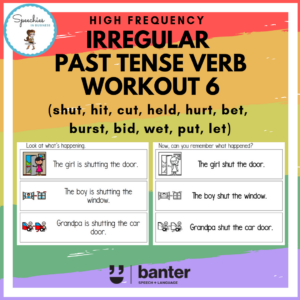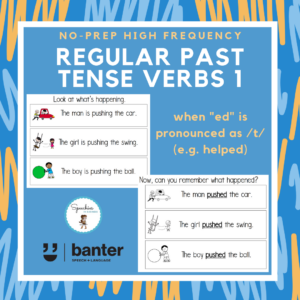(L137) Verbs: Irregular Past Tense Verb Workout 6: when verbs ending in /t/ do NOT take /əd/
$5.99 including GSTMost people learn the past tense form of regular verbs and the pronunciation rules without needing to be taught about them. However, people learning English as an additional language and/or people with developmental language disorders sometimes don’t pick up these patterns automatically.
In simple terms:
- “ed” is pronounced as /t/ when the sound before it is made without using your voice, e.g. if the base verb ends in an unvoiced sound like /p, s/ or /k/;
- “ed” is pronounced as /d/ when the sound before it is made with your voice “on”, e.g. if the base verb ends in an voiced sound like /b, z/ or /g/; and
- “ed” is pronounced as “ed” (unstressed /əd/) when the sound before it is /d/ or /t/ e.g. “dented”, “needed”, “shouted,” and “wanted”.
As is almost always the case with English, there are some exceptions! Sometimes words ended in /t/ and /d/ do NOT take /əd/ in past tense form.
This 27-page no-preparation Pack 6 is designed to provide people with structured practice of some of the most high frequency exceptions to the /t/ and /d/ rule: shut, hit, held, put, bid, wet, bet, burst, cut, let, hurt.





